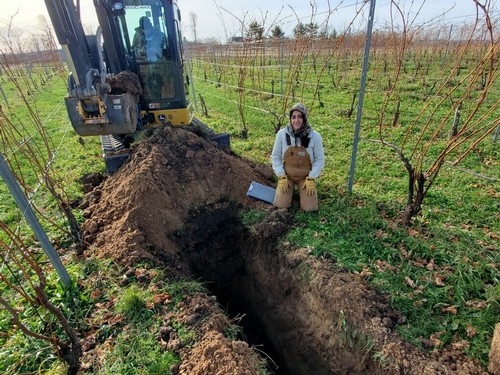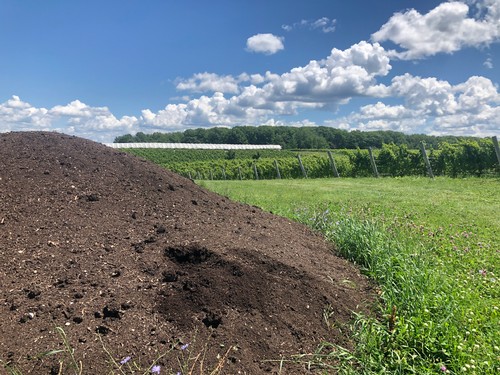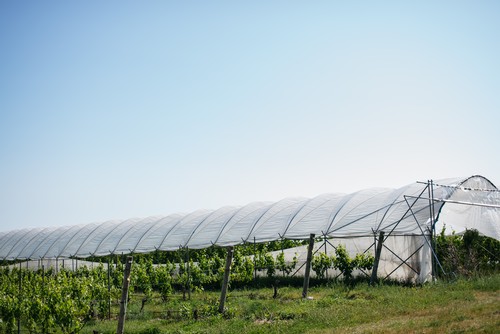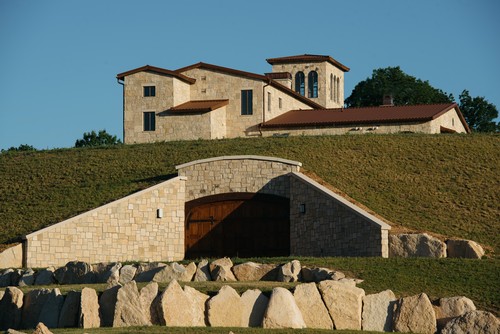Sustainability Practices
At Mari Vineyards, we believe the best quality wine comes from the healthiest grapes, and the healthiest grapes are grapes grown with sustainable agriculture. That's why we're constantly working to develop our procedures to attain that goal. One such procedure is reducing our environmental footprint by way of renewable energy.
Our cropping system has also received MAEAP (Michigan Agriculture Environmental Assurance Program) Verification, which focuses on sustainable water use, soil conservation, and nutrient management with the goal of preventing erosion and runoff risks. And every growing season we continue to develop our farming practices so that we can responsibly continue making top quality wines long into the future.
Below are details of some of our current sustainability efforts that help us to be the best stewards of our land:
Organics
- Our goal is to be both mindful and quality focused as we increasingly incorporate organic practices into our farming. We are working to create a healthier vineyard by decreasing our chemical usage, and have eliminated pre-emergent and emergent/contact herbicides in our vineyards. We do not use Roundup.
- We believe healthy vines make quality wines, and that healthy vines come from balanced, sustainable vineyards rather than quick-fix chemical fertilizers. Our philosophy of incorporating organic practices is designed to create exactly the kind of long-term sustainability and vineyard health that doesn't require such short term solutions. One way we create that balance is by only using benign sprays that preserve local native microflora.
Bee & Butterfly Sanctuary
- We are working closely with the Bee & Butterfly Habitat Fund to replace standard lawns with sustainable cover crops in the form of pollinator habitats. This foundation is a non-profit that offers seed subsidization in the form of specially cultivated seed mixes made for each individual property. The mixes are created based on soil structure, insect biodiversity, and many other factors that differ from place to place.
- Focusing on increasing biodiversity, Mari aims to use insectaries to help create natural habitats for honey bees and monarch butterflies, as well as regain a healthy balance with predatory insects to rebuild the ecosystem and reduce the need for pesticides. While vines don’t need pollinators to reproduce, diversifying cover crops benefits the microflora under the vines, creating a healthier and more beneficial soil.
Compost
- We are bringing life and biodiversity back into the soil to achieve balance. Most of our vineyards are glacial deposits, so everything we do takes sand into account. The mostly sandy soil of Northern Michigan usually has little organic material due to glacial movement; healthier, organic-rich soil helps plant immune systems so they can better fight off disease and harmful fungi.
- Various vineyards are already treated fully organically as we incorporate organic compost fertilizer into already healthy soil, such as our Jamieson Vineyard. We have an integrated composting program in which we utilize the refuse from pressing grapes (known as pomace) and other organic residue to create nutrient rich compost which can then be put right back into our farm. This compost is full of healthy fungus and bacteria that promote more life in the soil.
Soil
- Every wine derives its character from the soils that produce it. In Northern Michigan, we know we have to design our farming practices around conditions that can sometimes be challenging to the vinifera grapes that we grow. Even in established vineyards that have been around for forty plus years, we need to understand everything we can about the building blocks of the soil in order to keep improving. We utilize soil test pits in order to get granular details about each of our vineyards and exactly what our grapes need to thrive.
Innovation
Owner Marty Lagina participates in many ventures, including his wind energy company, Heritage Sustainable Energy. Years ago, Marty bought an old dilapidated windmill on the corner of Highway 72 & Grey Road, repaired it, and created a renewable energy source that was able to offset our entire winery facility's energy needs. After the aging windmill was eventually decommissioned in 2022 it was replaced with an array of solar panels, continuing this energy credit program.
Additionally, we also have a smaller windmill at our northernmost vineyard, Irish, which helps offset the energy utilized on that farm. These clean energy sources help inspire how things are done at Mari, with an eye for quality and sustainability.
- Incorporating novel technology allows us to explore our farming possibilities. Our Nella Serra Hoop Houses offer us more control over vineyard conditions without isolating the vines from our Northern Michigan climate, as well as giving the vines a little extra time to ripen.
- Northern Michigan has wonderful water quality. We invested in a state of the art system to reuse our winery wastewater to remove solids and to utilize gray water (recycled water) for irrigation on our farms.
- Our winery building is based on a gravity fed system; the grape press sits on a crush pad outside, which is one floor higher than our production area and two floors above our wine caves. Feeding hoses between the floors, we rely on gravity to do the work, allowing a reduced usage of pumps to get our juice from one area to another.
- The entirety of our production facility and wine caves are built underground, allowing a passive cooling effect and lessening our need for energy consuming temperature control.




